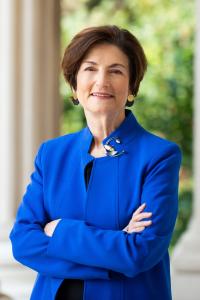
Human Flourishing Is a Collective Enterprise: Dean Fried’s Parting Lessons
Throughout her distinguished career, Dean Linda P. Fried has sat for countless media interviews. This Monday, however, she faced questions from a fellow dean, Jelani Cobb of Columbia’s Journalism School, in a special Q&A marking the conclusion of her 17-year tenure leading the Columbia Mailman School.
The wide-ranging public conversation highlighted Dean Fried’s transformative leadership, from curriculum reforms and pioneering climate-health initiatives to guiding the school through the COVID-19 pandemic. They also explored her formative experiences and the challenges posed by today’s funding landscape. Though stepping down as dean this summer, Dean Fried will remain at Columbia as faculty and director of the Robert N. Butler Columbia Aging Center.
Reflecting on her leadership philosophy, Dean Fried described beginning her deanship with a profound belief in the school’s mission and its potential global impact. She approached the role as both scientist and steward, applying rigorous methodology to institutional strategy while fostering shared purpose among colleagues. “We have to build it together,” she emphasized, underscoring her commitment to collaborative leadership.
Dean Fried’s career has been anchored in equity, from volunteering at a Black Panther Party health clinic in Chicago to advocating for women in medicine. She traced this commitment to a childhood moment when she was barred from being a sixth-grade crossing guard because of her gender. Later, as a welfare caseworker, she witnessed how health disparities stem from complex social determinants. “That was a very powerful experience,” she said, and one that helped cement her public health calling.
The discussion turned sobering as Dean Fried addressed recent federal cuts targeting public health and higher education—what she called “an all-out dismantling of structures that have been built for the public good.” Though public health has delivered undeniable returns, including decades added to life expectancy, she warned of society’s fading memory of its value. The recent measles outbreak in Texas exemplifies this dangerous amnesia.
When Cobb raised the correlation between austerity policies and worsening health outcomes—from declining U.S. life expectancy to stunted child growth in the U.K.—Dean Fried responded with another pointed example: After Greece halted mosquito control during budget cuts, malaria resurged despite decades of elimination. “I think there is a lesson there for us,” she said.
“We need to build a public health [system] that brings everybody in this country along with us,” Dean Fried asserted. While the field excels at identifying vulnerabilities, she urged colleagues to better explain how health inequities ultimately ripple across all communities. This reframing, she argued, could mobilize support for 21st-century solutions to challenges from climate change to loneliness epidemics. “Public health knows that human flourishing is a collective action problem,” she said, “and that collective flourishing lifts all boats.”
Looking ahead, Dean Fried articulated “a new vision for a public health system that delivers health in the 21st century context, for everybody in every community, designed for the modern age, invested in to make a difference for everybody, with no one left behind.” Her parting words framed both legacy and roadmap—a call to sustain the school’s culture of interdisciplinary innovation while courageously addressing the crises ahead.


